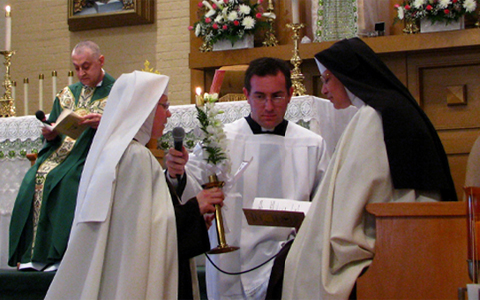 The Solemn Feast of Pentecost, which the Church celebrates on Sunday, is an annual opportunity for authentic ecclesial renewal. This year the need for the Church to beg the Holy Spirit for the gift of true reform is altogether too obvious, because the mystical body is hurting due to the accumulation of so many self-inflicted wounds.
The Solemn Feast of Pentecost, which the Church celebrates on Sunday, is an annual opportunity for authentic ecclesial renewal. This year the need for the Church to beg the Holy Spirit for the gift of true reform is altogether too obvious, because the mystical body is hurting due to the accumulation of so many self-inflicted wounds.
Pope Benedict called attention to these wounds during his flight to Portugal last week, when in the context of a question on the pope’s and the Church’s suffering in the third part of the Fatima message, he poignantly described that the greatest attacks on the Church are self-inflicted.
“Attacks on the Pope and the Church come not only from without, but the sufferings of the Church come precisely from within the Church, from the sin existing within the Church. This, too, is something that we have always known, but today we are seeing it in a really terrifying way: that the greatest persecution of the Church comes not from her enemies without, but arises from sin within the Church, and that the Church thus has a deep need to relearn penance, to accept purification.” Pope Benedict was clearly, but probably not exclusively, alluding to the sins of commission and omission involved in acts of clerical sexual abuse.
He also drew from the Fatima message the essential path of ecclesial healing, which he remarked involves “conversion, prayer, penance and the theological virtues [of faith, hope and love].” Mary’s 1917 message in Fatima began with calling the three shepherd children, and through them the whole world, to “penance, penance, penance,” and finished by summoning all the faithful to receive the grace of conversion and imitate Mary in consecrating themselves to God. This is the path of ecclesial renewal on which the Holy Spirit always seeks to guide the Church.
A detailed application of the Holy Father’s general summons to penance and renewal was given by Dublin Archbishop Diarmuid Martin a few days prior to the Pope’s pilgrimage. In a remarkably candid May 10 address on “The Future of the Catholic Church in Ireland,” the Irish prelate tackled the various sins that have wounded the Church in Ireland and then sketched the arduous path that true reform of the Church must traverse. Most of his comments apply not just to the Church on the Emerald Isle, but here in the United States and throughout most of the northern hemisphere.
Archbishop Martin declared that, on the one hand, he could not be “pessimistic” about the future of the Church, because he knows that at each moment in the Church’s history God the Father sends the Holy Spirit to teach us all things in Jesus’ name (Jn 16:13). On the other hand, he confessed to being “disheartened and discouraged” about the generally low “level of willingness to really begin what is going to be a painful path of renewal and of what is involved in that renewal.” He listed a few of the discouraging signs:
The first is an ecclesiological confusion about what genuine renewal entails. One group, more traditional, calls for a renewal that stresses a reinforcement of the Church’s institutional power structure in the face of ecclesiastical chaos and lack of accountability. The second group, more progressive, basically rejects the institution in favor of a bottom-up “We are the Church” ecclesiology. Archbishop Martin implied that both arguments are egocentric rather than theological. “Perhaps on both sides there may be an underlying feeling that ‘I am the Church,’ that the Church must be modeled on my way of thinking or on my position.” For renewal to occur, however, we must recognize that it is “never our own creation,” but involves “returning to the Church that we have received from the Lord.” It’s disherarting to Archbishop Martin, however, that many are clinging to their ideas rather than to the Lord’s.
The second and “most obvious” reason for discouragement, he notes, is the “drip-by-drip never-ending revelation about child sexual abuse and the disastrous way it was handled,” the “subconscious denial on the part of many” about the extent of the abuse and its denial, and the failure of the part of many to accept “responsibility for what happened.” The Church, like individuals, will only be renewed by confessing her sins in number and kind, taking responsibility for her sins, and doing penance for them. Many, he said, are discouragingly still in denial over the extent of the evil and their responsibility for it.
A third and “deeper” root of discouragement is because many, he said, do not recognize the profound “crisis of faith” that exists among large sections of the Church. “Our young people are among the most catechized in Europe but among the least evangelized,” he declared, meaning that many know the truths of the faith without personally believing and living them, an assessment that likewise applies to many Catholic adults. “Catholic identity,” however, “is more than a vague ethos” of Gospel values. It is fundamentally about “witness,” about living the faith. The larger context not only for the crisis of sexual abuse but for almost all of the other crises in the Church, he suggested, lies in the fact that many Catholics, including clergy, have separated identity from witness, faith from life.
Archbishop Martin noted that there are a couple of reasons for this separation between Catholic identity and faithful witness which has led to the Church’s salt losing its flavor. Both involve knowing merely about Jesus instead of knowing him personally. The first is a general neglect of Sacred Scripture. Catholics, he said, “do not know the Scriptures … [and] do not take the time to encounter Jesus in the Scriptures.” As St. Jerome said in the fourth century, “Ignorance of the Scriptures is ignorance of Christ.” The second cause is the way Catholic moral teaching is communicated. “The manner in which the moral teaching of the Church is presented to believers is far too often not adequately situated within the overall context of the teaching of Jesus, which is both compassionate and demanding.” Because of this lack of context, it becomes harder for Catholics coherently to grasp and persuasively to explain Catholic moral teaching within a contemporary culture that so often separates certain “hard” moral teachings from Jesus’ overall message of true love.
For true renewal to take place, Archbishop Martin said that Church history shows it must begin with “individual renewal” that leads to a thorough and “radical re-orientation” of parishes. Parishes must be “strong and witnessing faith communities,” real schools of prayer, learning and sacrificial love. True renewal cannot occur without parish renewal because “the Church is not … just a collection of individuals. The proclamation of the Gospel cannot adequately be carried out by correspondence course among people who never meet.” For those who want to see the Church reformed, therefore, they must help to reform their parishes, and that means they must stay involved and become more involved.
He also insisted that parish renewal must involve much greater emphasis on properly integrating young people into the life and mission of the Church. In many parishes, he said, there are very few programs to accompany teenagers and young adults in their continued education in the faith, which is one of the reasons why many are absent. This for him is the greatest source of discouragement of all. He said that there is an urgent need for more demanding sacramental preparation programs that connect catechesis to sacramental practice and parish life and love. “A form of religious education that is separated from the parish will inevitably collapse.” In many places, he said, it has.
Archbishop Martin, like the Holy Father, stressed that the “agenda for change in the Church must be one that comes from its message and not from pressure from outside. … True reform of the Church will only spring from those who love the Church, with a love like that of Jesus which is prepared also to suffer for the Church and to give oneself for the Church.”
This Sunday is a time for the whole Church to beg the Father to send the Holy Spirit to bind the Church’s self-inflicted wounds, bring us to penance and conversion, help us to love the Church as Christ does, and renew the face and heart of the Church through igniting our parishes with evangelical fire.












